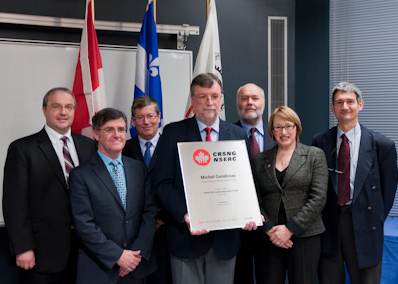Nouvelles
NSERC and Hydro-Québec join forces with Polytechnique Montréal: Inauguration of the NSERC/Hydro-Québec Industrial Research Chair on the Stochastic Optimization of Electricity Generation
When generated by water or wind sources, electricity is one of the cleanest and most sustainable forms of energy. All the same,
extracting power from such sources calls for careful planning and management, since it hinges largely on random (stochastic)
phenomena: the water used to generate electricity comes from snowmelt and rain runoff, while wind energy is highly variable,
uncontrollable and only partially predictable in the short term.
Held by Michel Gendreau, Full Professor with Polytechnique's Department of Mathematics and Industrial Engineering, the NSERC/Hydro-Québec Industrial Research Chair on the Stochastic Optimization of Electricity Generation will focus on developing effective, efficient approaches to dealing with the challenges of stochastic optimization encountered in managing electric power systems driven by wind or water sources.
"One of the biggest issues facing Hydro-Québec is the need to maximize energy production in a timely manner, using the available resources," said Christophe Guy, Chief Executive Officer of Polytechnique. "The Chair seeks to facilitate this task by developing mathematical models for optimizing the management of electricity-generation operations. We are proud to count Hydro-Québec among our partners, thus confirming our position as a Canadian leader in engineering research."
Pushing the limits of existing optimization models
Certain stochastic optimization models have been
explicitly designed to take randomness into account. However, while researchers are able to write equations for these models,
no computer has the capacity to integrate quite so many variables. "Modelling water supply is already a problem in itself. But
when combined with the state of the network, historical patterns in time and space, and data from the many reservoirs, the
calculations explode," noted Professor Gendreau.
As part of its research, the Chair will require concrete data to verify the models. Historical data from Hydro-Québec, combined with synthetic data to generate comparisons with reality, will play a key role in the Chair's work. Hydro-Québec, in turn, is pleased to support the development of knowledge in the field. Gaétan Lantagne, Scientific Director of the Institut de recherche d'Hydro-Québec (IREQ), said: "The Chair's work will help us train new resources who can work in tandem with IREQ experts. Together, they'll develop innovative management tools that can help us better plan for hydroelectricity generation and the integration of wind power."
The Chair's research will entail a two-pronged approach involving both methodological considerations and specific applications. The methodological aspect will focus on developing and assessing new computational methods for solving problems of optimization in the presence of uncertainty. As for applied projects, the Chair will develop models and methods for use in the co-ordinated management of the bulk power system or in hydrological systems with multiple large reservoirs.
"An international leader in the area of optimization, Professor Gendreau possesses the expertise and experience required to
make important contributions to the management of electricity generation systems," said Dr. Fortier, president of NSERC. "In
addition to allowing Hydro-Québec and other power authorities to use their water resources more efficiently, this Chair will
offer particularly strong training opportunities for the students and personnel involved."

From left to right : Bernard Poulin, Gaétan Lantagne, Gilles Savard, Michel Gendreau, Christophe Guy, Suzanne
Fortier, Pierre Baptiste.




